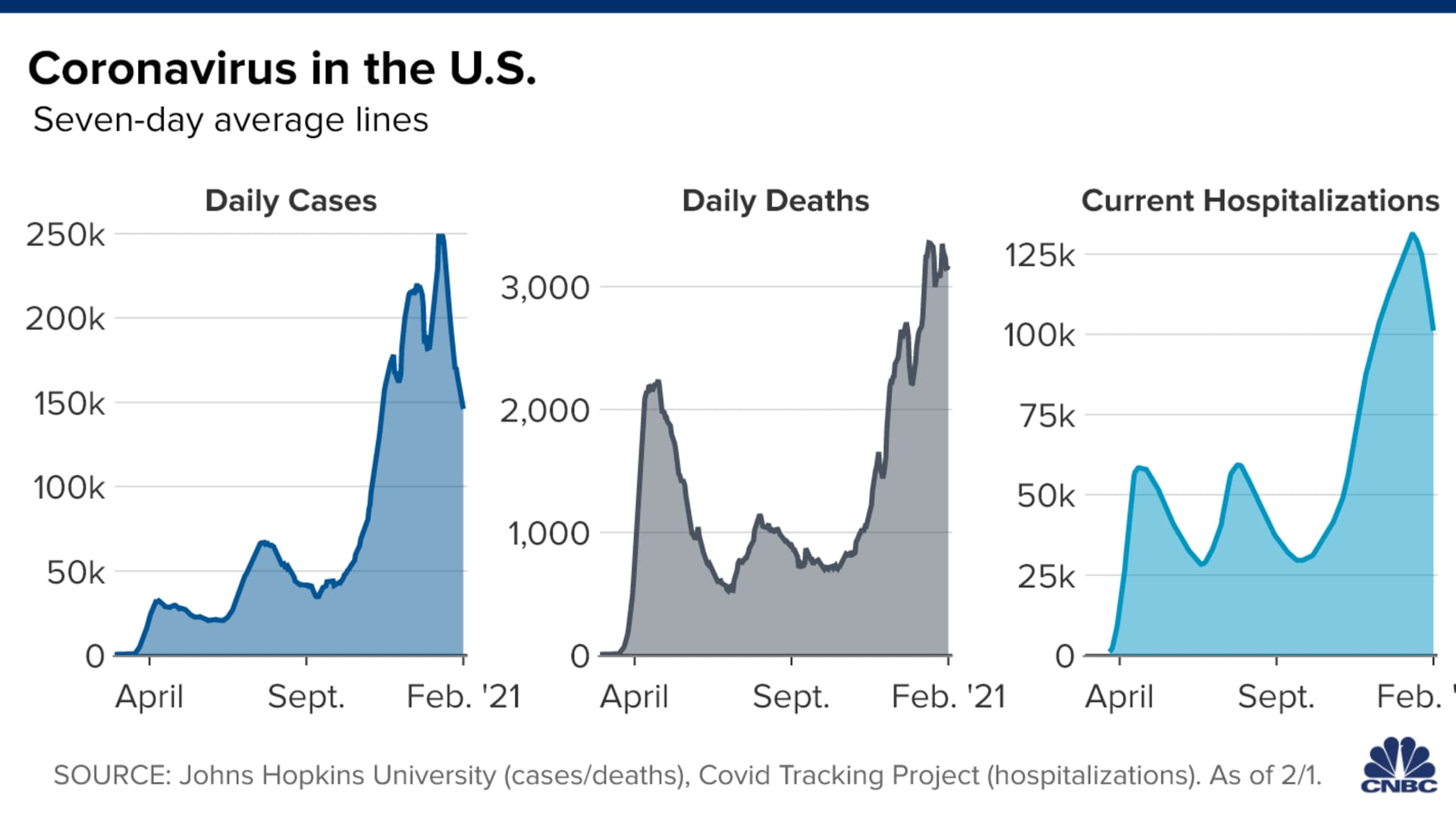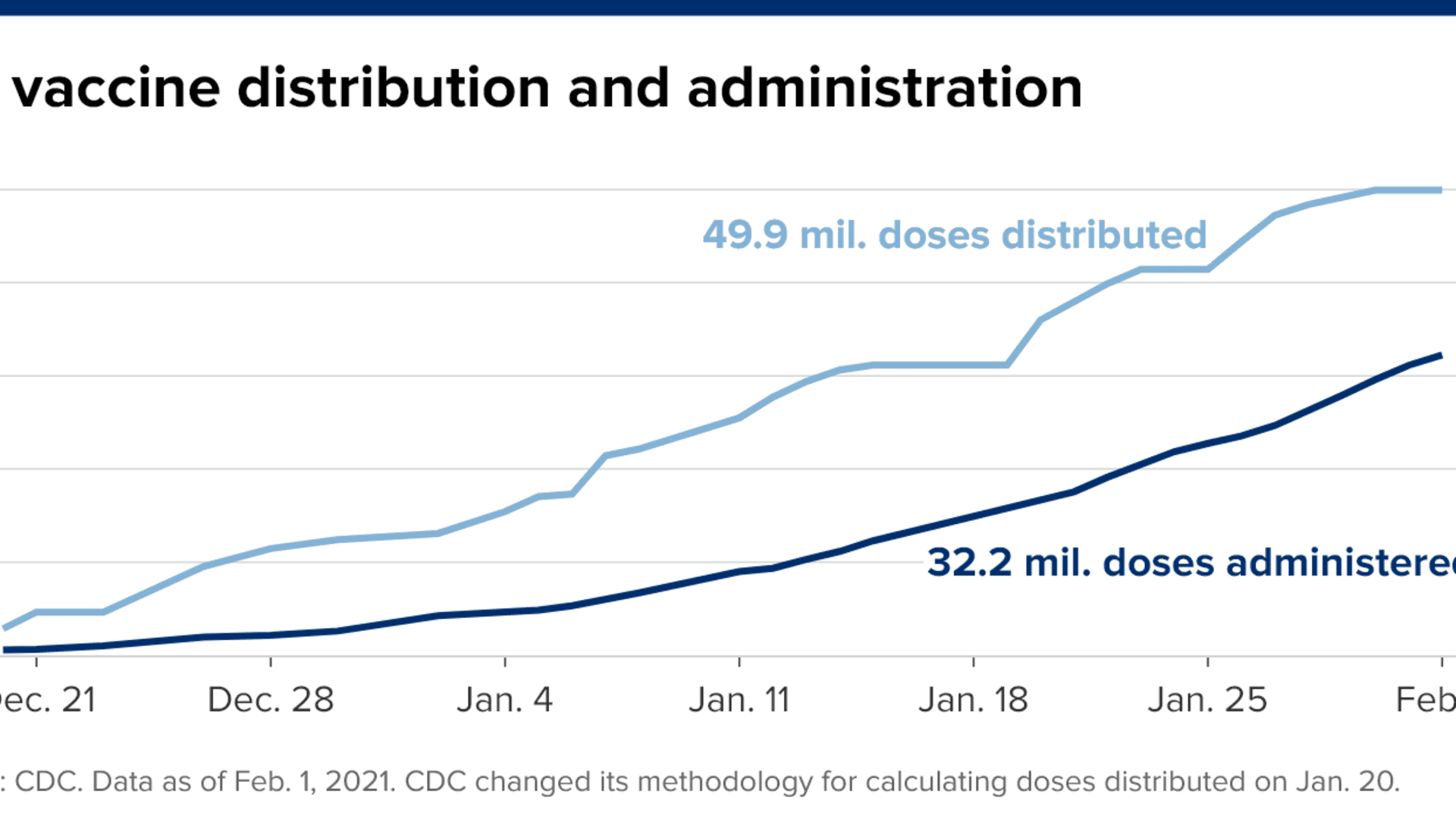
- Coronavirus cases and hospitalizations are dropping rapidly in the United States.
- But epidemiologists and public health specialists say new, more contagious variants of the virus threaten to undo progress and lead to a resurgence.
- The reopening of businesses and loosening of restrictions could also lead to a quick resurgence of the outbreak.
The United States appears to be turning a corner on the Covid-19 pandemic as cases and hospitalizations rapidly fall across the U.S., but that progress could be thwarted by more contagious strains that have quickly taken hold in other parts of the world.
The U.S. reported 134,300 new cases of the virus on Monday, bringing the average number of new cases over the previous seven days to 146,000, according to data compiled by Johns Hopkins University. That's down about 41% from a peak of almost 250,000 new cases per day last month.
The number of people hospitalized with Covid-19 across the country has similarly fallen. There were 93,500 people in hospitals with Covid-19 across the U.S. as of Monday, according to data from the COVID Tracking Project, which was founded by journalists at The Atlantic. That's about 29% lower than the peak of 132,400 people hospitalized with the disease in the U.S. on Jan. 6.

Daily new deaths from Covid-19 remain high but appear to have hit a plateau. More than 3,100 Americans are dying from the disease every day, based on a seven-day average, according to Hopkins data. Daily new deaths lag cases and hospitalizations by a few weeks, so epidemiologists expect that figure to soon start to fall as well.
But epidemiologists warn that the U.S. is in a dangerous point in the pandemic. They expressed concern that the declining numbers could lull the country into a sense of complacency when more caution than ever is needed. And while the numbers are off their peaks, the level of infection remains so high in most of the country that the loosening of restrictions as well as the spread of more contagious variants could still undo the country's progress, they say.
Money Report
The declining numbers come after what federal health officials have said was likely a surge driven by travel and celebrations linked to the winter holidays, including Christmas and New Year's. Dr. Bill Schaffner, an epidemiologist at Vanderbilt University in Nashville, Tennessee, said he's worried the trends won't hold.
"There seems to be already a tendency, including in my own community, to start opening things up again, letting the bar stay open later and that sort of thing," Schaffner said in a phone interview. "I'm worried about that because I thought we'd learned that lesson. As soon as you do that, cases start to go up again."
And while the U.S. has now authorized two vaccines from Moderna and Pfizer-BioNTech, the rollout has hit hurdles, Schaffner pointed out. The Trump administration had hoped to distribute enough vaccine doses to immunize 100 million people by the end of February. So far, the U.S. has distributed almost 50 million doses of the two-shot vaccines, according to data from the Centers for Disease Control and Prevention.

Schaffner said state and county officials are ramping up the vaccination process as they get comfortable handling the shots, but there's a long way to go. He added that he hopes Johnson & Johnson's one-shot vaccine will be authorized this month, bolstering the U.S. supply of doses.
In addition to loosening restrictions and a slow vaccine rollout, Schaffner noted that the emergence of new, more contagious variants could also lead to a resurgence if they spread widely across the U.S. Epidemiologists are most concerned with three variants from the U.K., Brazil and South Africa that have all been found in Covid-19 patients in the U.S. The B.1.1.7 strain was discovered in the United Kingdom in the fall and is the dominant variant there; the B.1.351 was recently found in South Africa and has taken hold there. The P.1 variant in Brazil has become the dominant Covid-19 strain there.
The U.S. doesn't do nearly as much genetic sequencing as, for example, the U.K., which means it's difficult to know exactly how widespread the variants are in the U.S. The CDC has confirmed more than 400 B.1.1.7 cases, three cases of B.1.351 and just a single case of P.1 so far. But Schaffner said the variants could soon be "rampant."
Dr. Leana Wen, former Baltimore health commissioner, said the spread of the new variants could lead to "exponential explosive spread."
"There's a sense of dread of what's to come," she said.
— CNBC's Nate Rattner contributed to this report.






